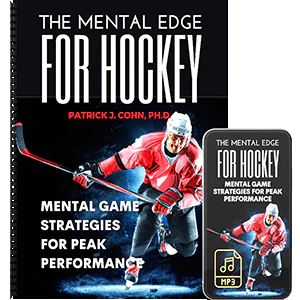
Best Age to Start Mental Training
Improving the mental game is a training component that is often overlooked. Some young athletes may not even know what mental training is or how it can benefit them.
Even parents and coaches do not fully understand how mental training works or how to access to such training.
Mental training is often viewed by coaches and parents as an advanced part of training that athletes should consider after they become older and more competitive in their sport.
One hockey parent posed an interesting question in our online survey regarding mental training for athletes:
How often should kids prepare mentally for upcoming games? Once a week? Twice a week? Just on game days?
This is a great question and is three-fold:
1. When should an athlete start a mental training program?
2. How often should an athlete engage in mental training?
3. How many days before a competition, should an athlete mentally prepare?
Let’s examine these questions one at a time…
When Should an Athlete Start a Mental Training Program?
Your athlete can start working on their mental game as soon they start training and competing in a sport. This may sound crazy but it’s very logical.
Let me explain, your athlete learns physical and technical skills to gain a high level of proficiency, to make a habit of those skills. Mental skills also need development and repetition. Just as technical skills start at a basic level and are built to more advanced skills, the same is true for mental skills.
I’ve worked with athletes on the mental game as young as 8 years old. This is a good time to introduce the concepts of focus, confidence, and composure. However, we usually recommend that athletes don’t start formal mental training when they are 12 years old.
How Often Should an Athlete Engage in Mental Training?
Your athlete can build upon their mental skills before, during or after every practice or competition. You can simply ask after practice, “What two things did you do well today in practice?”
This simple question will help your child focus on the positive and build confidence. After your child becomes older, you can seek the advice of a
Mental Game Coach to further build mental skills.
How Many Days before a Competition, Should an Athlete Mentally Prepare?
Mental preparation is a big area and includes many mental skills for athletes. But it should not be complex for young athletes. Just helping them identify what confidence is and how they feel when confident is a good start.
During a mental coaching session with a young athlete, the athlete asked: “What is confidence?” This athlete’s mom responded: “confidence is putting good thoughts into your mind about your game.”
Parents and coaches want to start small and talk about how to focus when on the ice, how to forget mistakes, or how to not worry about what others think when they play hockey. These skills are universal and can be life lessons as well.
This is the reason we produced “10 Minute Pregame Prep” for young athletes and their parents. Athletes listen to a 10-minute audio prior to each game and learn an important mental game skills.
Related Articles on Hockey Mental Game:
- Finding the Time for Mental Training
- Improve Consistency With Mental Training
- Unlock Your Confidence With Mental Training
*Subscribe to The Sports Psychology Podcast on iTunes
*Subscribe to The Sports Psychology Podcast on Spotify
The Mental Edge for Hockey

The Mental Edge for Hockey teaches you proven and simple mental game strategies so you can overcome fear of failure, lack of confidence, slumps or poor composure, take your practice game to competition, and boost your confidence in hockey. You learn simple, actionable mental game strategies to help you perform at your peak!
I’ve worked with athletes for 30 plus years – and know the top challenges that undermine performance when you perform in games. Now you can tap into my expertise and experience in coaching hockey players on the mental game.
In this program, you’ll learn the TOP 10 mental training lessons for hockey players – the same strategies I teach one-on-one athletes I coach on the mental game. My clients pay thousands of dollars for personal coaching, but now you can have the same strategies to improve your mental game – at a fraction of the price.
Leave a Reply